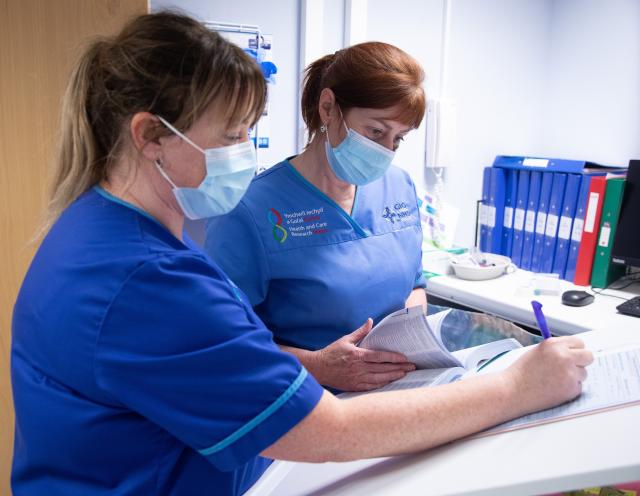
Taking a Wales-wide approach to deliver research
21 July
When you’re faced with the reality of having only hours and days to set up and deliver urgent public health research, collaboration is essential.
The global pandemic has taught us many things, including how we can work better together across Wales to deliver safe and effective research.
Through our One Wales approach, we have been able to set up and deliver 119 COVID-19 studies, including 7 vaccine trials, providing an opportunity for around 60,000 people in Wales to take part in research.
This approach is integral to our research delivery plans as we move forward.
One Wales
In Health and Care Research Wales our mission is to promote, support and provide collective oversight of health and social care research in Wales to ensure it is of the highest international scientific quality, is relevant to the needs and challenges of health and social care in Wales, and makes a difference to policy and practice in ways that improve the lives of patients, people and communities in Wales.
Through our nationwide, collaborative response to the pandemic, we have successfully implemented and improved a range of approaches to research delivery under the One Wales model. These include a range of efficient ways of working across our country to ensure quick turnaround and faster study set up and delivery in Wales. Our national oversight means that quality remains paramount within our service for our research teams, for study leads and sponsors wanting to carry out research here.
“We were used to having months to set up research studies but suddenly we were faced with the prospect of only having days to do this, while meeting all the same strict regulations,” recalled Dr Nicola Williams, Director of Support and Delivery at Health and Care Research Wales.
“For vaccine research, we set up a national vaccine hub, introduced a Wales lead Principal Investigator, and we also established a single site for Wales, Public Health Wales. Our model means we can do things once for Wales, including national standard contracts, which helped speed up the process.
“We’re proud to have delivered seven vaccine studies, the results of which have helped to inform the COVID-19 vaccination programme across the UK. We’ve also delivered key COVID-19 treatment studies – including PRINCIPLE, RECOVERY and REMAP-CAP – that have determined which drugs are effective and importantly which drugs are not effective.”
Better access to research
Around 60,000 people took part in COVID-19 research studies in Wales during the pandemic. Access to research opportunities varied from attending mass vaccination centres to taking antiviral medication at home.
“Thanks to our One Wales collaborative approach, people have had better access to research where they live and that means more people have been able to take part in research, ultimately meaning we’ve been able to answer more questions through research,” said Dr Williams.
Learning from COVID-19
Our One Wales model is not just relevant to COVID-19, it is designed to be used across all research areas.
One of the first non-COVID studies to be rolled out using the model is SYMPLIFY, which is evaluating a new multi-cancer early detection test that can detect over 50 types of cancers.
The aim of the SYMPLIFY study is to demonstrate how the test could be used to increase cancer detection rates and simplify diagnosis.
The SYMPLIFY trial has recruited 1,164 participants at 19 district hospitals, across all seven Health Boards in Wales, coordinated by Velindre University NHS Trust, as the single site for Wales.
Our reputation and services
Our One Wales model allows us to make sure we have oversight of research studies across Wales, so we can make sure we follow the studies through from set up to delivery.
“Our proactive, national approach means we have greater opportunity to meet recruitment targets, on time, with a fast escalation process to rapidly spot and resolve study performance issues. This is demonstrated by our proven track record for study delivery during the pandemic,” said Dr Williams.
“Due to the volume and scale of the studies we’ve set up and delivered, we’ve also been able to develop new skills within our experienced research delivery teams.
“We also plan to build on this through our new Health and Care Research Wales Faculty, which makes sure health and social care researchers have the right training and support to develop their careers – creating a clear professional pathway and strengthening our ability to deploy the best research people when and where they’re needed.”